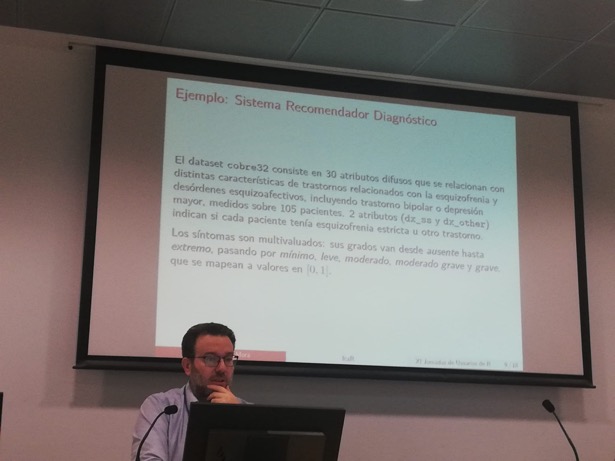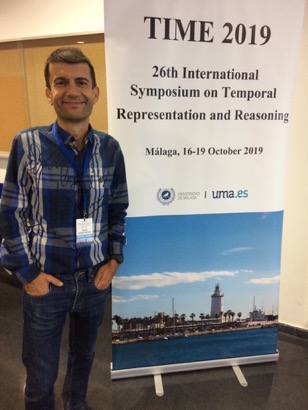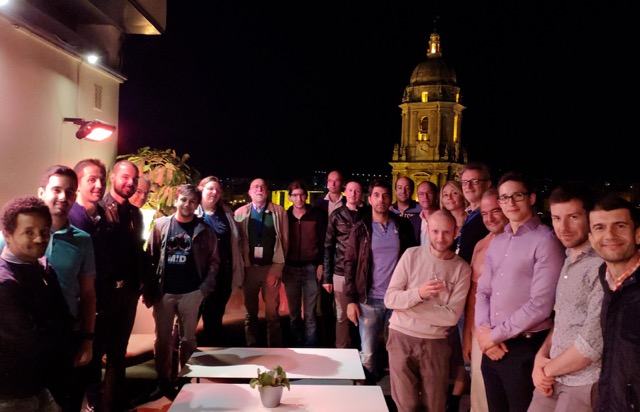November 2019
Journal paper accepted
28/11/19/13:33 Filed in: Journal paper
N. Madrid and M. Ojeda-Aciego. Multi-adjoint lattices from adjoint triples with involutive negation. Fuzzy Sets and Systems 405:88-105, 2021.
ABSTRACT We focus primarily on the use of involutive negations in adjoint triples and the satisfiability of the contraposition law. Instead of considering natural negations, such as n(x)=x -> 0, we consider an arbitrary involutive negation and an arbitrary adjoint triple. Then, we construct a multiadjoint lattice (an algebraic structure with several conjunctions and implications) with the help of two new adjoint triples defined from the original one and the involutive negation considered. Finally, we present several results that relate the different implications and conjunctions appearing in the mentioned multi-adjoint lattice in terms of the logical laws of contraposition, interchange and exportation.
ABSTRACT We focus primarily on the use of involutive negations in adjoint triples and the satisfiability of the contraposition law. Instead of considering natural negations, such as n(x)=x -> 0, we consider an arbitrary involutive negation and an arbitrary adjoint triple. Then, we construct a multiadjoint lattice (an algebraic structure with several conjunctions and implications) with the help of two new adjoint triples defined from the original one and the involutive negation considered. Finally, we present several results that relate the different implications and conjunctions appearing in the mentioned multi-adjoint lattice in terms of the logical laws of contraposition, interchange and exportation.
Spain UseRs Annual Meeting
27/11/19/08:41 Filed in: Workshop participation
XI Jornadas de Usuarios de R de España
Last November, 14-16, we presented a communication on the development of a package aimed at the application of Formal Concept Analysis, implemented in the R programming language. The title of the communication was fcaR: An R Package for using Simplification Logic with FCA and was presented by Domingo López-Rodríguez and Ángel Mora, within a session focused on the application of data analysis tools to healthcare and biology.
The package was designed to manage formal contexts and extract implications from a given dataset, and to provide tools to visualize the extracted knowledge. Furthermore, the package provides an efficient implementation of the Simplification Logic for crisp and fuzzy contexts, which allows to remove redundancies within implications very easily. Thanks to these functionalities, the package can be used to compute attribute set closures and can be used as the formal core to recommender systems.

As an application, the package was used to build a recommender system in hardly 3 lines of code, to help in the differential diagnosis of schizophrenia with respect to other schizoaffective disorders.
In addition, this package has been designed to integrate with arules, the reference package of association rules in the R programming language, making it very usable by the R community researching and investigating on association rule mining and knowledge discovery.
Journal paper accepted
12/11/19/13:33 Filed in: Journal paper
A. Burrieza, E. Muñoz-Velasco and M. Ojeda-Aciego. A flexible logic-based approach to closeness using order of magnitude qualitative reasoning. Logic Journal of the IGPL 28(1):121-133, 2020.
ABSTRACT In this paper, we focus on a logical approach to the important notion of closeness, which has not received much attention in the literature. Our notion of closeness is based on the so-called proximity intervals, which will be used to decide the elements that are close to each other. Some of the intuitions of this definition are explained on the basis of examples. We prove the decidability of the recently introduced multimodal logic for closeness and, then, we show some capabilities of the logic with respect to expressivity in order to denote particular positions of the proximity intervals.
ABSTRACT In this paper, we focus on a logical approach to the important notion of closeness, which has not received much attention in the literature. Our notion of closeness is based on the so-called proximity intervals, which will be used to decide the elements that are close to each other. Some of the intuitions of this definition are explained on the basis of examples. We prove the decidability of the recently introduced multimodal logic for closeness and, then, we show some capabilities of the logic with respect to expressivity in order to denote particular positions of the proximity intervals.
HARMONIC'19
12/11/19/13:00 Filed in: Workshop participation
Herramientas Difusas Para el Razonamiento No Canónico, HARMONIC'19
We have had a nice extended week-end in Grazalema where the workshop HARMONIC'19 has been held. We had a number of interesting discussions on preliminary ideas for future work and prospects for new collaborations.
We participated with two contributions: the first one was done by Domingo López, who presented the recent R package developed for dealing with fuzzy implications "fcaR, an R package to handle fuzzy implications: design of a recommendation system for medical diagnosis"; the second contribution was a joint paper together with our colleagues Fran Valverde and Carmen Peláez from Univ. Carlos III Madrid entitled "On FXA for data analysis".
TIME'19
04/11/19/10:58 Filed in: Organizing


